Launchpad 39A at the NASA Kennedy Space Center has been used for the Apollo program (including Apollo 11), the Space Shuttle Program, and SpaceX’s most recent launches. Oh, and also for My Little Rocket, a student rocket I built as part of the Space Engineering and Rocket Science Department at the International Space University on the 14th of July 2012!
Since today is the 5 year anniversary of that event, which still is the most fun day of my life, I thought I would share the story and some images! Enjoy :)
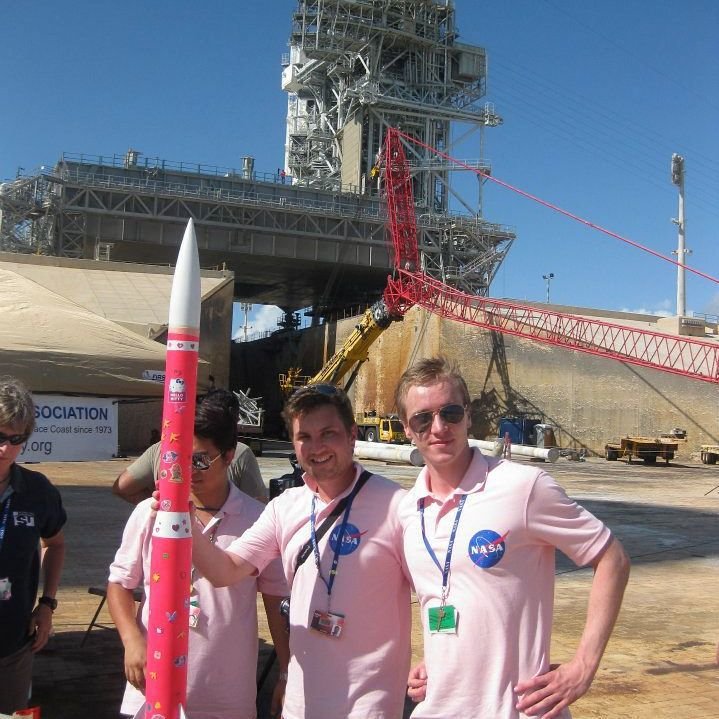
Me and my team mates from China and Austrialia in front of Launchpad 39A
In the department, our final exam was to design, build and launch our own rocket. It’s success criteria were to bring a raw egg and a 0,5kg crystal to an altitude as close as possible to 1000 feet, with a total airtime as close as possible to 50 seconds, while keeping the egg whole! A demanding task for an (almost) 22 year old Economics student with only high-school physics and an introduction course in rocketry in the baggage. However, as someone who has never turned away from challenges, but instead embraced opportunities to gain new skills, it was an amazing experience!
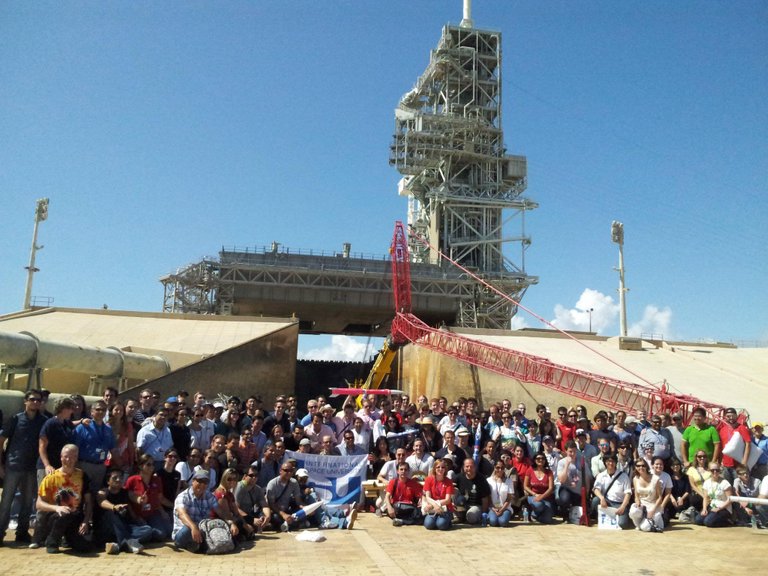
All participants in the 2012 Space Studies Program of the International Space University together in front of Launchpad 39A
I expect one-half of you are curious about how we went about doing the design of the rocket, how we decided on what engines to use, how we ensured that the rocket would split at the right time to allow the parachute to come out, etc. While the other half of you are just wondering how high we had to be to come up with this design. The truth is, while the main focus was to deliver upon the set targets, we were also told that the other participants would be voting on which rocket they thought had the best looking design. So, keen on winning as I always am I went out and asked participants what they would love to see. Now, if you’ve seen what popular votes tend to result in – such as the 200 million USD Research ship being names “Boaty McBoatface – you would see this coming. You can imagine me the next day scrolling through Walmart with a trolley, picking off the shelf anything pink and girly that I could find. Pink and White spray paint. Stickers with hearts, Hello-kitty, peace symbols and birds, glitter in all the colours of the rainbow. Pink polos. I’ve always thought that when you try to make a joke that will inevitably make a fool of yourself you have to go all in. And we sure did.
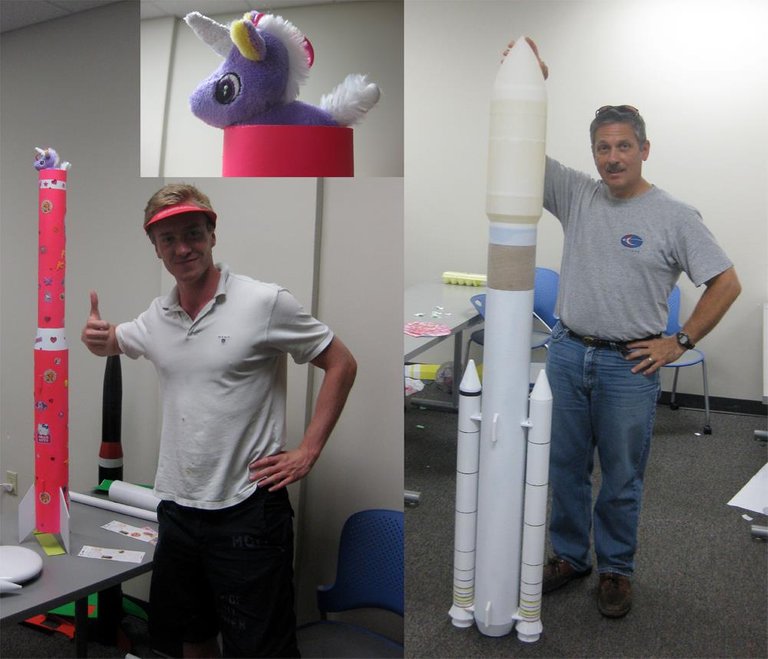
On the left: Myself inserting our Space Unicorn mascot inside the rocket (she came down safely with the parachute!). On the right: Our Department head, a rocket scientist at NASA’s Johnson Space Center in Texas, with their less impressive rocket (a scaled down model of NASAs new Space Launch System SLS)
The launch-day is still one of my most fond memories. It was both fun, exciting, educating and memorable. How often does anyone get to walk on the same launch complex used for the Apollo program? Let alone do their own little launch at the facilities? The press was also present from 9 different TV-channels and space magazines. I gave a short speech about how our imagined company Unicorn Galactic were on a mission to spread peace and love throughout the Universe, as well as some technical insight about how the rocket was powered by children’s laughter and happy pandas. As well as the fact that the engine flew on rainbow-power. Chosen because it’s more environmentally friendly. Parts of it found its way to NASA.gov’s own pages in the educational section.
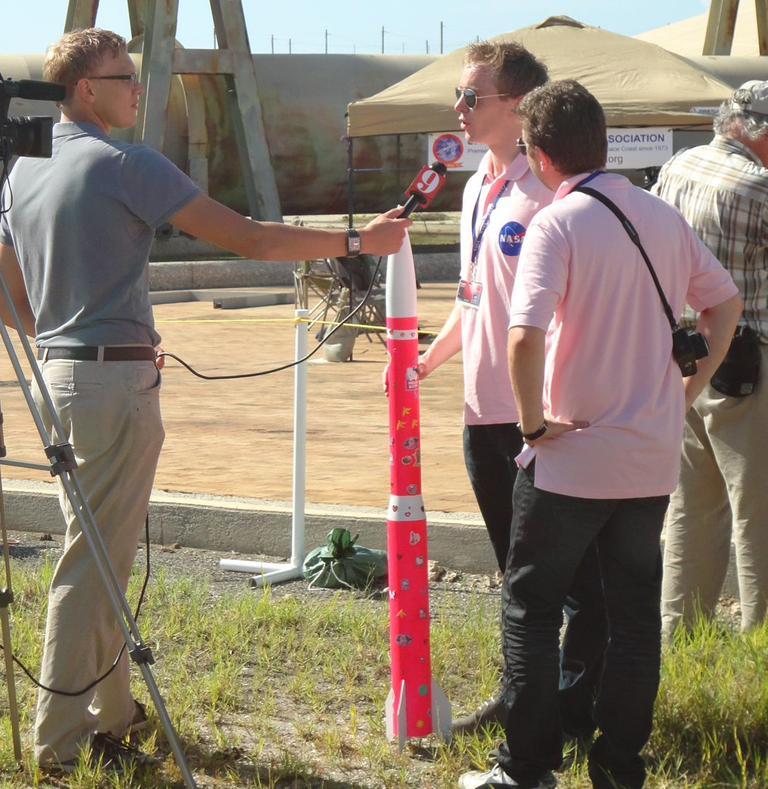
”Fredrik Aarrestad of Norway said his team built its pink rocket, named "My Little Rocket," to show the peaceful uses advanced technology can be employed for. The team included a small, purple stuffed Unicorn in their rocket, the mascot of Unicorn Galactic.”
source: nasa.gov
In the end, our Rocket reached an altitude of ~700 feet and came back down after just under a minute. The egg was also nice and whole following a successful deploy of the parachute. Due to the wind being stronger than anticipated, our launch had to go at some degree less than 90 towards the direction of the wind to ensure good stability of the rocket. Resulting in a lower altitude than our target. A very respectable result nonetheless!
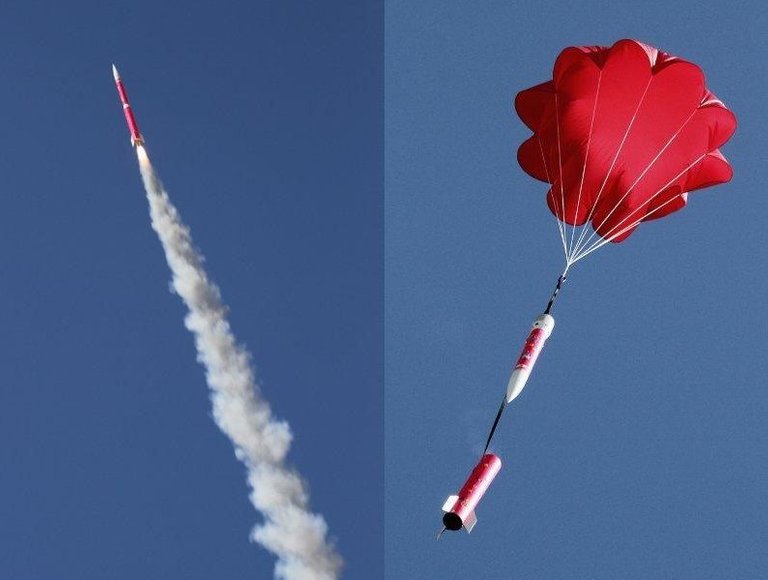
"My Little Rocet" in the air above NASA Kennedy Space Center
The parachute came out 8 seconds after launch together with a load of glitter colouring the sky for a brief moment to our audience's amucement! While our score ranked 4th out of 9 launches (which I was really happy with!) we absolutely crushed the design competition! I think two of the lessons learned is that 1. You can take on a lot of challenges that you don't neccessarily feel prepared to take on if you have the neccessary curiosity to learn and the people around you that can give you the support you need. 2. If you ask the internet or your friends about how they want you to paint your car, boat, house or rocket, you should expect the worst, and be prepared to make a fool of yourself for their amusement ;)
So to conclude:

Hope you found this blog post fun and interesting to read!
Thank you for reading this far! My next posts will likely be:
- “My conversations with 25 Astronauts, and what it taught me about life, our planet, and much more”
- "Beautiful Satellite images you won't believe are real #2"
- "A day of work at the European Space Agency - suesas-sciencechallenge"
Special kind of stupid.
Cg
Been haunted by these people ever since my introduction post.
Never thought there would be such a large community of them here on steemit.
Maybe I should do a new series with Smackdowns to common flat-earth claims found in all the videos they keep posting on my articles :P
Yeah possibly, though cognitive dissonance is strong, so I'm sure they would come up with some "fake news" argument.
I would definitely follow and vote for that series though :-)
Cg
Thanks! First time I've gotten a compliment on my hair from a flat-earther ;)
Yeah... these people give me a headache, too XS
Out of curiosity: What would be sufficient evidence for you that the Earth is not flat?
I'm happy to have a constructive dialogue.
There is no sufficient evidence for people who believe they are "in on something" or that they are cleverer than the rest of us poor, mere mortals.
I mean, in all flat earth drawings, it would have to be day or night, across the entire planet at once, this is the easiest thing in the world to disprove. However they will just bend their "theory" to fit this anomaly.
The best thing is to ignore them completely.
Cg
Thank you Lasse for sharing this video, the experiment done here is very clever. Finding such an open area with a proper distance to buildings we can all easily research is a great experiment and a good way to settle this discussion.
Now as far as I can see this video only provides evidence of a round Earth... First of all, the buildings appear only from their "waist" and above. I mean, you can clearly see that with your own eyes at both max and medium zoom, that the horizon cuts off the lower parts of the buildings.
Much more significantly though, is that the entire Toronto Islands, with the Toronto Island Park (including some tall trees), are completely gone. Despite the fact that they are literally right between the photographer and the CN Tower and Roger’s Center (see image below).
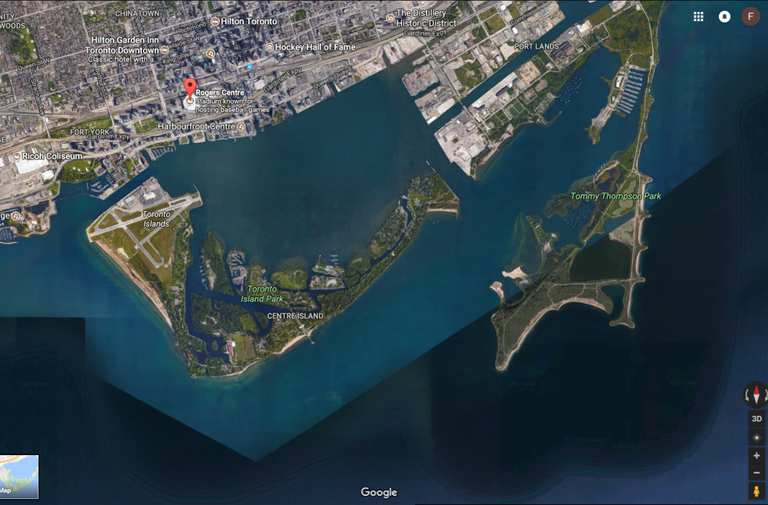
Now how do you best explain that from a flat earth perspective? Why can’t we see the island, any of the trees, or the lower parts of the buildings?
As for the numbers she gives at the start, where she claims that the curvature should have dropped the buildings by 517 ft (158m), these are simply not applicable. Why? Because they are obtained from a formula that measures drop height based on the assumption that the Earth is a perfect sphere (it uses the Pythagoras theorem to obtain change in height based on a perfect 2 dimensional circle). Which we have known for decades that it is not. A perfect sphere would mean that you have a perfectly slick and even curvature for every single mile. But that is not the claim made by any scientists. We know the Earth is not like a perfect circle, or a smooth billiard ball. I mean, we have 7km tall mountains and 10km+ deep oceans, so of course it is not a perfect sphere. And therefore you cannot use those formulas as some places on Earth it will be different from others.
Below you can see what we at the European Space Agency have estimated the shape of the Earth to be based on data from the GOCE satellite which measures gravitation fields used, among other things, to measure the shape of the Earth. You can see it explained here by the New Scientist
Or in a video here.
As you can see yourself on the video, at different points on the Earth curvature will be different. Now, if you pause the video at 20 seconds you will see that North America is actually relatively flat. So that explains why the curvature is not as much as she thought it would be when she used a formula based on a perfect sphere.
Still I’m eager to hear how you explain why we don’t see the trees on the Toronto Islands, or the lower parts of the buildings.
Peace
Wow, that must have been a really fun day!! If you are trying to go fabulous, well you should go all out and you did just that :D haha!
Even though you came 4th in the contest, my personal opinion is that the other rockets had nothing on your perfect pink hello-kitty-ladden rocket :D
But in all seriousness man, this was such a great post. The "lessons learned" at the end made my day! :)
P.S. You nailed it with that meme also. lol
Thank you for the nice feedback :)
I expect that I may have to do another post or two on this event covering more on the challenge itself, and how we got about doing the calculations etc. So many good memories worth sharing!
Haha, I guess I may want to try adding some memes to other posts as well then :P
hahaha great post and final meme! Abrazos!
Thank you :)
Yeah, it was an awesome day! And great fun :)
That's not the rocket I was expecting! If you lit a fuse instead of pressing a button it doesn't count! :P
We did press a button ;) Even had the official "voice of NASA" (the guy who does the official countdowns to all of their launches) to do our countdown :D
🚀 😋 👍
Upvoted & RESTEEMED :]
Thank you :)
LOL! Very cool!
Haha, we had so many good laughs while building it, on the day, and on every re-union since :)
=))))
Looling cool !!!
Instantly resteemed ! That's soooooooooo cool dude ! :D
I'd love to chat with you about how you came to work at the ESA. Are you on steem chat or something else ?
Thanks! Yes it was both cool, fun and memorable indeed!
I will share more on how I got to work at ESA in upcoming posts :)
Congratulations @fredrikaa! You have completed some achievement on Steemit and have been rewarded with new badge(s) :
Click on any badge to view your own Board of Honor on SteemitBoard.
For more information about SteemitBoard, click here
If you no longer want to receive notifications, reply to this comment with the word
STOP👍👍
You may not think its too much that you did here, but to me its very awesome! You designed a rocket with NASA! Super awesome!
It was super awesome indeed! Still feels unreal :P
I am amazed by the comments... :/
That's a very cool project for students. I would have loved doing something similar ^^